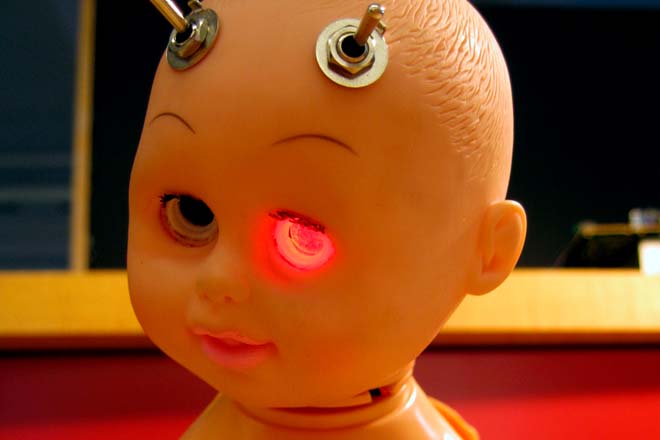My intern is a mutant, I found him on the Internet
Christophe is a 15 years-old digital native geek, Internet overuser, passionate about news. The kind of teenager that one has to listen in order to understand how to survive to the digital Big bang.
Jean-Christophe Feraud is a French journalist working for Les Echos (media and tech service), one of the top French economy newspapers. He is especially involved on the Internet : he is running a blog and Twitter account. Below is ere how he met his 15-year-old intern and draws some conclusions regarding new media and Internet.
__
I met Christophe a few months ago, by subscribing to his Twitter account: @FoireauxLiens (aka “@linksfair”). I already spotted his news tweets during my morning press review. They broke whith the maniac regularity of a press agency newsfeed.
 Twitter became a vital press monitoring tool for doing my job as a journalist… Or even kind of an hard drug. I noticed a few tweets on Christophe’s feed dealing with hot tech news (the incoming release of the GooglePhone for instance) and I told myself: this guy is an ace, a real reaper of interesting news, a press agency all by himself.
Twitter became a vital press monitoring tool for doing my job as a journalist… Or even kind of an hard drug. I noticed a few tweets on Christophe’s feed dealing with hot tech news (the incoming release of the GooglePhone for instance) and I told myself: this guy is an ace, a real reaper of interesting news, a press agency all by himself.
Surely one of those young ambitious web journalists, slowly digging the graves for me and my forty-or-so buddies in the elephant graveyard of the Gutenberg era.
I had never met him IRL, just a few hints shared on Twitter. And one day, I get a “DM”: a direct message from Christophe asking me politely if he could do his internship in my service at “Les Echos”.
Well, this guy must still be a journalism student. I ask him for a CV, references, internships that he already did, blah blah… Silence on the other side of the line… “Well… I’m in my fourth year of secondary school, but I wanna become journalist…”, he tells me. Christophe is 15 and lives the suburbs of Paris.
I nearly fall off my chair, put myself together and tells him “OK man, you got the job”… meaning a week of internship [In France, teenagers all have to do a short internship around the age of 15]. Of course we are experiencing media crisis, progress can’t be stopped… But here we don’t handcuff 15 years old guys to a keyboard in order to make them piss papers on every support! … yet. Still, I may as well exploit him a bit on my blog !
Isn’t Christophe one of this young numeric mutants who don’t have enough eyes to flick through the mass of screens of our wonderful high-tech consumption society? That’s an interesting experiment subject: let’s ask him how, him and the youngsters in general use/consume media.
This exercise is trendy since Morgan Stanley interviewed 15-year-old Matthew in order to see through how old media, caught in the mediastorm, can survive to the numeric big bang. I borrowed the idea to my colleague Mari-Catherine Beuth who already had her own intern go through Morgan Stanley’s questionnaire on his blog Etreintes Digitales.
Enough chit-chat! Here is Christophe’s Oracle, 15 years old and digital native

__
Internet is the first media
Youngsters from my generation, born in 1992-1994, are born with the Internet. But we don’t use it the same way. I’m fond of computers and journalism, so Internet is the first media. For others, it is still TV. Or videogames. I use Twitter a lot, because I think it is a very useful tool. For a lot of things. Twitter allows me to get news in a new way, to talk to people who are interested in the same things than me. In short, to do things that I couldn’t do easily at my age…. Like acting as a journalist, for exemple. Internet enables fast and free acces to the news in the whole world. If I am particularly interested in something, I can find all the news about it without any problem. It is not possible on other medias.
90% of my time on Twitter
Twitter is the way I got an internship at “Les Echos”. It is very useful for sharing, chatting, meeting. It remains my first tool on the Internet. I’m on Twitter nearly 90% of my “Internet Time”, which is approximately two or three hours a day for the common youngsters… and up to 5 or 6 hours for the most connected like me.
I’m worried about Facebook
The youngsters are a lot more on Facebook than on Twitter. I’m sick and tired of hearing the “You’re on Facebook?”, and even more “You’re NOT on Facebook?”. Some of them are on Facebook 80% of their “Internet Time” and think that I don’t want to share my profile with them. But when I see what they share without worrying a second about their private life, I find this pretty scary. So I avoid it, and went off this shit a few months ago.
MSN to stay in touch
On the other hand, I let my MSN messenger connected permanently to stay in touch with a few friends if they need to reach me. Regarding e-mails, they don’t use it, they prefer instant messages or text messages. I find it very useful because I can file what I receive and use it again.
I barely watch TV…
Frankly, I’m not that into TV. I’d rather go on the Internet. If I want to watch a video, I go on YouTube. If I’m interested in a topical issue, there are far more things on YouTube than on TV: images from the whole world, and also images filmed buy ordinary people, not necessary journalists. I’m barely interested in movies, I prefer documentaries that talk about real life and know what’s happening in the world. I use websites for downloading movies or TV shows. But others do it a lot, as you might know.
I hear a lot of worries about newspapers
Within Les Echos I hear a lot of worries about newspapers regarding Internet. I was not really aware of that before. It’s true that youngsters don’t buy newspapers since that’s too expensive and less handy. To reach the news, they surf the Internet because it’s free, easy, though they start to be upset because there are too much advertising, as on 20Minutes.fr. Personally, I buy Le Monde or Le Figaro from time to time. In the printed press, articles are far better than on the web in general. There are more information, analysis, context. And much less press dispatches copies. The problem is that to subscribe, you need to make it done by an adult. It’s pretty blocking.
![]()
For youngsters to get interested in newspapers, it is not enough to make things on the Internet interactive, but rather to propose them special offers or make them discover press from the inside. What would be nice would be to see a bit more of how it works inside newsrooms, that kind of stuff, but unfortunately this sector is pretty hush-hush, especially when you live in the suburbs.
__

Decoding
Alright, Christophe is not really representative of the average teenage. Even if he denies it, he’s a true geek who prefers his computer screen to TV, in front of which he spends several hours a day while others are more likely to play football.
He’s an Internet overuser, one of the few teenagers we can come accross on Twitter (basically, used only by journalists, digeratis and bloggers, else we would hear more about it). He’s also a news addict, an enthusiast like I have seldom seen. He may become a journalist, I wish him to if he still wants it in ten years (provided journalists will not be replaced by robots) :)
He’s also a tomorrow’s reader : he is already. That’s precisely interesting when it comes to newspapers’ future and media in general. This young digital mutant has not understood me when I told him that, at the beginning of my career, I used to copy/paste my stories with glue and scissors . He asked me “do we have to systematically print articles ? It’s wasting paper !”. He also confessed that he started to be interested in printed newspaper via their online website. Exception ? Probably.
But do you know what he told me ? “You and me are not from the same generation, but we are not that far actually. Each of us tries to take a look at the other side. I am seduced, even fascinated, by printed press. You became a fan of Twitter and blogs..”
Get out of the fruitless generation conflict between old and new media, have youngsters interested in printed press thanks to the Internet, and have printed press more interested in youth and its new way of multi-screen consumption. For newspapers, that’s probably one of the key to survive the digital Big Bang, far beyond the neverending debate about how to make people pay for my content on the Internet.
We always need to discuss with youth.
__
First posted on J-C. Feraud’s blog, entitled “Mon stagiaire est un mutant, il m’a trouvé sur Twitter“. We also have published the post on OWNI.fr.


Laisser un commentaire